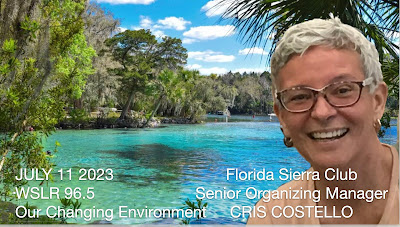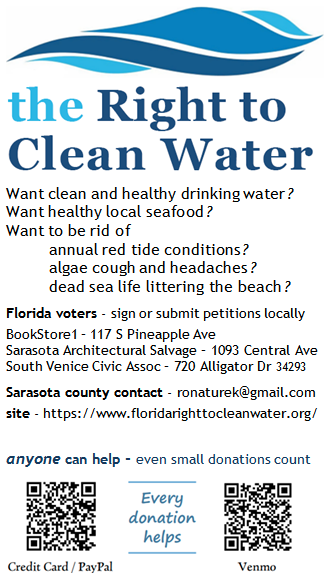Prof. Larry Brand of the University of Miami spoke to the Suncoast Waterkeeper March 3, 2019.
From the
Bradenton Herald - Ryan Ballog
See Brand's presentation online
here from the Bradenton Times.
Brand is a professor of Marine Biology and Ecology at the Rosenstiel School of Marine and Atmospheric Science at UM.
 |
Larry Brand - photo: Tiffany Tomkins
Bradenton Herald |
In 2007, he
published research with colleague Angela Compton that attributes a long-term increase in red tide severity directly to human activity. The study made use of date collected by the Florida Fish and Wildlife Research Institute from 1994 to 2002.
Brand and Compton’s conclusions are in direct contrast with other prominent red tide researchers in the state of Florida, including Mote Marine Laboratory and the Florida Fish and Wildlife Commission.
Both Mote Marine Lab and FWC claim that there is no direct evidence linking nutrient pollution with the frequency or start of red tide blooms.
Brand disagrees with how they are interpreting the data.
The culprit behind intense harmful algal blooms, Brand says, is nutrient overload in state waters due to human activity. Brand says that the nutrients that cause extreme red tide blooms are carried to Florida’s west coast from Lake Okeechobee via the Caloosahatchee River.
Harmful algal blooms aren’t just a Florida problem. The issue is popping up
all over the world.
“We’re having to feed seven and half billion people on this planet now,” Brand said. “That takes a lot of food. That takes a lot of nutrients. The two major nutrients you need are nitrogen and phosphorous.”
Those same nutrients will feed algal blooms when out of proportion, Brand explained.
“When you fertilize your crops, you’re not 100 percent efficient. Basically the algae need the same exact nutrients as the higher plants do on land. So you have this runoff of these nutrients and you generate algal blooms.”
Florida’s natural geology also comes into play.
Phosphate deposits on the west coast enrich waters with phosphorous, while limestone-dominated east coast waters are richer in nitrogen. The balance is thrown further out of whack by the extra nutrients, allowing harmful algal blooms to thrive.
In addition to runoff from farmlands, Brand says that the drainage and rerouting of Florida’s waterways has caused natural nutrient deposits buried over thousands of years to become exposed.
Nutrient pollution and subsequent harmful algal blooms have dramatically increased since the government started subsidizing the sugar industry in the 1950s, Brand says.
"We need to try to move towards science-based and common sense water policy,” said Andy Mele with
Suncoast Waterkeeper.




